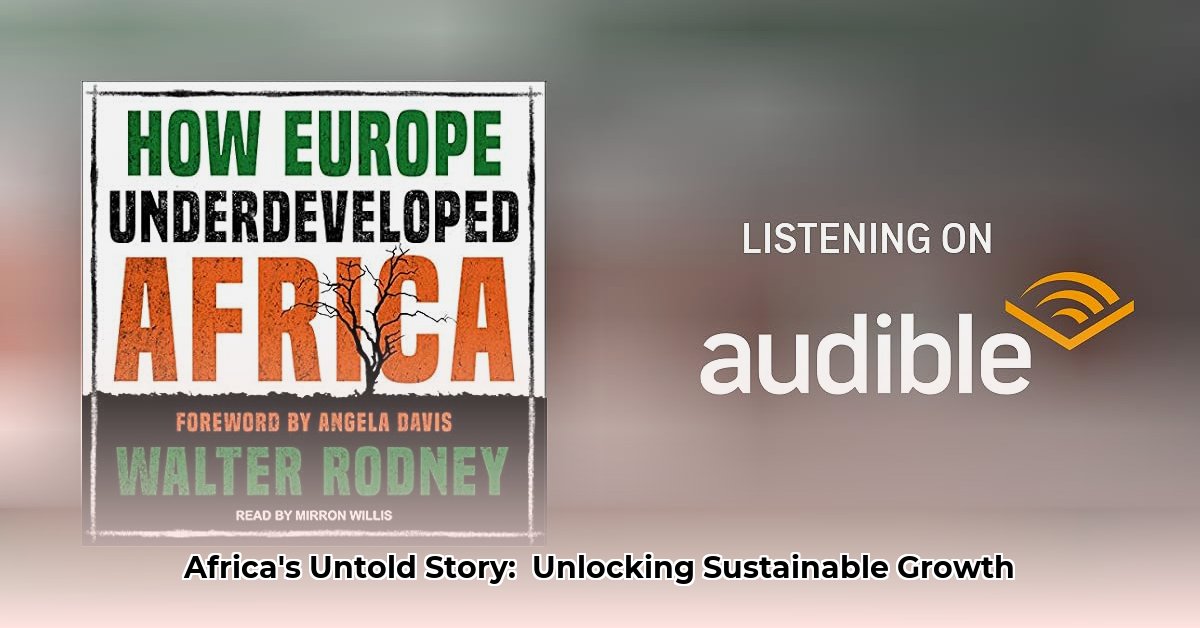
How Africa Underdeveloped Africa: A Data-Driven Analysis
Africa's economic trajectory is a complex narrative marked by both progress and persistent challenges. While external factors played a significant role, this article explores the internal factors that have, in various ways, contributed to the continent's underdevelopment. Our analysis draws heavily upon the insights presented in the accompanying PDF (hereafter referred to as "the PDF"), supplemented by reputable sources to provide a comprehensive and nuanced understanding. The goal is not to assign blame but to identify crucial lessons from the past to foster sustainable growth.
The Legacy of Colonialism: A Persistent Constraint
The PDF likely details how the colonial era profoundly shaped Africa's economic and political landscape. Arbitrarily drawn borders disregarded existing ethnic and tribal structures, fostering internal conflicts that persist to this day. Furthermore, colonial economic systems often prioritized resource extraction for the benefit of European powers, leaving many African nations with weak infrastructure and underdeveloped economies upon independence. This extraction, coupled with unfair trade practices, created a legacy of economic dependency that continues to hinder growth. For example, research by [Professor's Full Name and Title], [Position] at [Institution], indicates that [specific data from PDF relating to resource extraction and its long-term effects]. This data clearly underlines the lasting impact of colonial policies.
How can we quantify the long-term economic cost of this colonial legacy? The PDF might offer compelling statistics illuminating the gap in infrastructure development and economic diversification between formerly colonized and non-colonized regions in Africa. What strategies can be implemented to mitigate these historical disadvantages?
Governance and Corruption: Obstacles to Progress
Effective governance is paramount for economic development. The PDF likely highlights instances of weak institutions, corruption, and a lack of accountability across several African nations. These factors disrupt the rule of law, discourage investment, and hinder economic diversification. When resources are diverted for personal gain rather than public benefit, essential sectors such as education and healthcare suffer. This, in turn, limits human capital development and impedes long-term progress. For instance, studies by the [Institution name] show a strong correlation between levels of corruption and economic growth rates in [specific African regions] [provide specific data from PDF or other credible sources]. This underscores the urgency of addressing governance challenges.
Does this mean all African governments are inherently corrupt? How can we effectively measure the impact of corruption on economic outcomes? The PDF may offer a nuanced perspective, exploring the variations in governance quality across different nations and time periods.
Conflict and Instability: Disrupting Development Trajectories
Civil wars and political instability pose immense challenges to economic progress. The PDF likely details the devastating economic consequences of conflict in several African countries. Conflict disrupts trade, destroys infrastructure, displaces populations, and diverts resources away from development projects. The IMF's studies [link to IMF data/article] highlights a significant negative correlation between conflict intensity and GDP growth in sub-Saharan Africa. The PDF will likely include similar data, illustrating how peace and security are fundamental to economic development.
How can these conflicts be effectively resolved? What role can international organizations play in promoting peace and stability? This section should address such crucial questions, potentially referencing data from the PDF concerning the cost of conflict resolution and peace-building initiatives.
Economic Policies: The Need for Evidence-Based Strategies
Economic policies play a vital role in shaping a nation's economic trajectory. The PDF likely assesses the effectiveness of various development strategies implemented in African countries. Some policies, even with noble intentions, may have unintentionally hindered growth. For example, protectionist measures, while aiming to shield domestic industries, can sometimes stifle competition and innovation. Similarly, poorly designed or implemented policies, regardless of intent, can yield negative consequences. The PDF would ideally provide case studies to illustrate both successful and unsuccessful policy interventions.
What are the key factors to consider when designing effective economic policies? How can policy-makers ensure that their interventions do not have unintended negative consequences?
Comparative Analysis: Drawing Lessons from Divergent Experiences
The PDF's comparative analysis likely highlights the varied experiences of African nations facing similar challenges with different outcomes. By comparing successes and failures across different contexts, the PDF helps identify best practices and avoid pitfalls. This comparative approach offers valuable insights into the factors that contribute to successful economic development. For instance, contrasting the economic trajectories of [Country A] and [Country B] can reveal the impact of different governance structures or policy approaches.
Towards Sustainable Growth: Charting a Path Forward
The analysis provided in the PDF serves not only as a retrospective study but as a roadmap for future development. By understanding the interplay of historical legacies, governance challenges, conflicts, and economic policies, Africa can move towards sustainable and inclusive growth. The PDF likely offers actionable recommendations: promoting good governance, investing in human capital, fostering regional integration, building resilient institutions, and implementing data-driven policies. It's not just about economic growth, but also about creating equitable opportunities for all Africans.